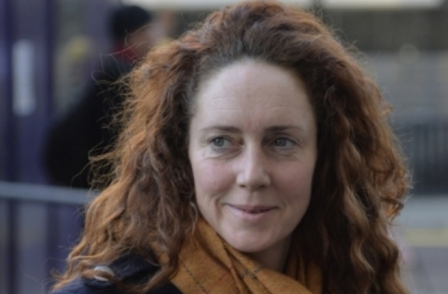
Media mogul Rupert Murdoch pleaded with Rebekah Brooks's personal assistant to stop her boss resigning at the height of the phone-hacking crisis, a court heard today.
The executive chairman of News Corp phoned Cheryl Carter on July 7 2011, the day the closure of the News of the World was announced, the Old Bailey was told.
Giving evidence in the hacking trial for a second day, Carter said: "Rupert Murdoch called me. He wanted to make sure I was looking after her and he said 'Please, do not let Rebekah resign'.
She said she passed on the message, adding: "Mr Murdoch was concerned about Rebekah."
The call came a couple of days after it emerged that murdered schoolgirl Milly Dowler's phone had been hacked.
Carter described her shock and disbelief at the news, saying: "I did not think anyone ever could do that to anyone."
Asked by her lawyer, Trevor Burke QC, about Brooks' reaction, Carter said: "She was shocked as well and very upset."
Brooks left her job as News International chief executive on July 15, when she was escorted from her office. She was arrested two days later.
The court heard that Brooks would confide in Carter, and even named her as a beneficiary of her company health policy.
But Carter said she never talked to her about her affair with co-defendant and former NotW editor Andy Coulson.
Brooks was the "kindest person" and an "amazing mum", Carter said.
She added: "She is the most hard-working person I have ever met, which meant I had to be hard-working."
Asked by Mr Burke if she believed Brooks was involved in phone hacking, Carter said: "No, I did not and I do not."
Asked if she would break the law for her, Carter stated repeatedly: "I would not commit a crime for Rebekah Brooks."
Carter, 49, of Chelmsford, Essex, denies conspiring with Brooks to pervert the course of justice by removing seven boxes of potential evidence from the News International archive.
Brooks, 45, of Churchill, Oxfordshire, also denies conspiring to hacking phones and commit misconduct in public office.
All seven defendants in the case deny the charges against them.
Carter was cross-examined by defence lawyer Jonathan Laidlaw QC about her communication with his client, Brooks.
He said: "There was, I suggest, no conversation about seven boxes and no conversation about anything being taken out of the archive on the 8th of July."
She replied: "That's correct."
Prosecutor Andrew Edis QC went on to demonstrate how many notebooks could be stacked in a box like the seven Carter removed from the NI archive.
The court heard that Carter went through the contents, binned 30 of her own notebooks and returned anything belonging to Brooks.
After listing all the items Carter said were in the boxes, Mr Edis asked: "Did you file three empty boxes?"
She replied: "No, I did not."
Yesterday, for the first time, Carter said she retrieved the boxes to look for documents to do with a trademark dispute involving her cosmetics business, the court heard.
Asked why she had never mentioned this before, Carter said: "I did not think about it at the time."
Edis went on to ask why she chose a busy week when it was "top priority things only" at the NI offices.
Carter recalled feeling "really sad about the people who lost their jobs" at NotW but also that she did need to get the boxes.
Edis asserted that the boxes labelled as Brooks's notebooks were "what it said on the tin". Carter disagreed.
Email pged@pressgazette.co.uk to point out mistakes, provide story tips or send in a letter for publication on our "Letters Page" blog

